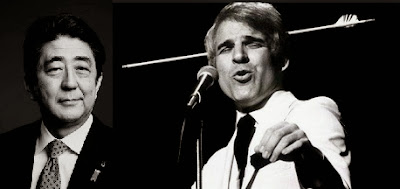
Two wild and crazy guys.
It's impossssible...
To put a Cadillac in your nose!
It's just imposssssible!
- Steve Martin, Let's Get Small (1977)
One of the classic gag lines, in both sense of the word "gag," in the world of politics and statistics for the last two decades has been the annual reporting of growth rates of the GDPs of China's provinces. For reasons of political expediency and personal promotion within the bureaucracy and the Chinese Communist Party, the officials of all China's provinces have been reporting GDP growth rates greater than the national average, despite the teeny tiny problem of such a result's being utterly impossible. The response of the world's China's watchers to this ridiculous transformation of the world's largest country into a hypertrophied Lake Wobegon, Minnesota ("where all the women are strong, all the men are good-looking, and all the children are above average" - Link) has always been chorus of knowing giggles.
Lately, and sadly, this perennial source of wonderment and merriment has undergone a downsizing, leaving this small, blue-green planet a rather less amusing place. (Link)
Have no fear, bewildering statistics lovers, I present to you...the second Abe Cabinet!
You may have missed Monday's Nihon Keizai Shimbun article on the results of that paper's most recent public opinion poll. In it, quietly and without any fuss, lay a paradox. Not a particularly impossible one (on the order of Steve Martin's above) but still a rather eyebrow-raising one.
Nihon Keizai ShimbunAdmittedly, it is unusual to see a drop of 7% over a month when the Diet is out of session and not much has happened -- at least not much the government of Abe Shinzo had any control over, aside from the predictable failure of the DPRK government to produce the report it promised on the fates of Japanese abductees, a possibility (inevitability?) that the Abe government should have gone out of its way to semaphore well before the end of last month. The most reasonable explanation for the drop is a return to the norm, as the 60% support reading was recorded immediately after the announcement of the new cabinet lineup with its attractive record number of women ministers.
Telephone survey of 26-28 September 2014 (previous month's results)
Q: Do you support or not support the Abe Cabinet?
Support 53% (60%)
Do not support 31% (26%)
The mind-twisting results in the Nikkei poll are the responses to the questions on the policies of the Abe Cabinet:
Do you support the raising of the consumption tax to 10% in October next year?
Support 28%
Do not support 66%
Do you have high expectations for the government's efforts to revitalize the rural areas?
Have high expectations 35%
Do not have high expectations 47%
Do you have high expectations for the Abe government's policies raising the stature of women?
Have high expectations 43%
Do not have high expectations 40%
Do you believe that the restart of the nation's nuclear power plants must be pushed through?
Must be pushed through 34%
Not necessary to be pushed through 53%
Look at the first of each pair of numbers. These are the support numbers for the Abe government's policies or else the percentage of the population having faith in the Abe government's ability to carry out its policies. In every instance, the expression of support or faith is 10 percentage points below the percentage of voters expressing support for the Cabinet.
Basically, the second Abe Cabinet is more popular than ANY of its policies. A lot more.
Take just a moment to figure that one out.
Then perhaps throw your hands up in the air and admit:
"I don't get it. OK, maybe the old saw about the whole being greater than the sum of its parts is true...or the average of the parts...or whatever. Really?"
The paradox of the Abe Cabinet's "being" being more popular than anything the Abe Cabinet is "doing" or "wants to do" does fit into a long-term pattern of public reactions to Abe Shinzo. In his first term a prime minister his Cabinet's popularity and his international standing rose and fell in inverse relation to his acting according to his own personal record, his professed values and his promises.
In other words, the less Abe acted like himself, the more his popularity and international stature rose.
Not much has changed in that department. What is strange is that not liking what the Cabinet is doing is not translating this time around into not liking the Cabinet. The support numbers for the Cabinet stay fantastically high, a-historical in their stability.
Most peculiar, this Abe fellow. He provokes the cognitive dissonance in folks.
There is, of course, one big difference in between now and seven years ago, one that a follower posted immediately after I tweeted this conundrum on Twitter:
@MichaelTCucek - Imagine if there were an Opposition to criticize the policies and propose alternatives for them. Yes, just imagine.
— Colin Doyle (@nagaijin) September 29, 2014Yes just imagine it...because with the current cast of clowns in charge of the opposition (Link) one's imagination is all one can rely upon.
No comments:
Post a Comment